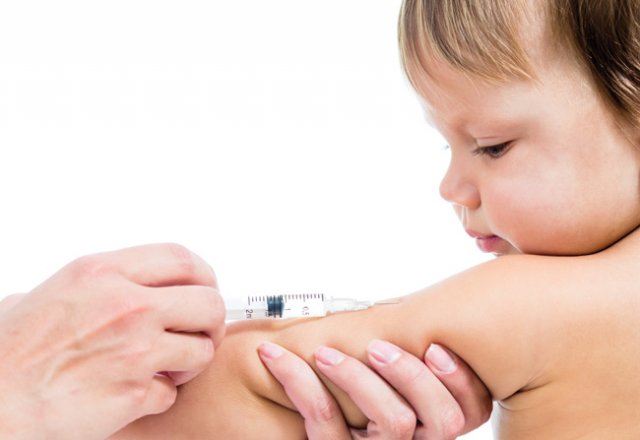
The vaccination debate

Should you immunise your children?
Most parents opt to vaccinate their children but a small minority are choosing not to. What are their reasons and how does this impact the rest of us? David Goding investigates
The mere mention of immunisation is enough to get an immediate reaction. Mention the word ‘debate’ in the same sentence and you’re likely to be met with a heated response.
“There is no debate,” says Alison Gaylard, from the Northern Rivers Vaccination Supporters Group, an area with one of the lowest rates of immunisation in Australia. “There is science and medicine and then there is fear-mongering, lies and Chinese whispers.”
Michael Moore, CEO of the Public Health Association of Australia, agrees.
“There are those who take responsibility for their children, their families and their communities by carefully weighing the evidence of risk of disease against the risk of vaccinating and then take action. Then there are those that do not vaccinate,” he says.
But like it or not, parents are debating the issue of vaccination and some, controversially, are choosing not to vaccinate. What are their reasons? Are they on to something or are they being downright irresponsible?
“We decided not to vaccinate both our children and it was the best decision we ever made,” says Nicola Kerr, a passionate anti-vaccination supporter. “It was an easy decision knowing what we do about vaccines. The hardest part of not vaccinating is having other people judge you – that you are ‘bad’ for not vaccinating. It’s frustrating that most people vaccinate based not on knowledge but trust that people are telling the truth.”
The pro-vaccination argument is compelling. According to a report released by UNICEF, the global under-five mortality rate has dropped by 41 per cent since 1990, thought to be largely due to increased rates of immunisation. Immunisation against polio and measles, in particular, has resulted in dramatic declines of these potentially deadly and debilitating illnesses. Such statistics are hard to ignore.
The anti-vaccination movement
Those opposed to vaccinations do so for one main reason: that a vaccine may cause a negative immune reaction that triggers autism. Indeed, autism was considered quite rare in the early 1980s before childhood vaccines became widespread, with US estimates of only one in every 10,000 births. By the late 90s, this had increased to one in 500. Of course, this is not evidence in itself, but it was enough to raise suspicion.
“Could it be more than coincidence that the rate of autism was rising rapidly in the early 1990s?” asks Dr Richard Halvorsen, British GP and author of The Truth About Vaccines. “Could giving babies mercury-containing vaccines at an earlier and more crucial stage of development followed by the introduction of the measles, mumps, rubella vaccine (MMR) have constituted a ‘double whammy’, that was just too much for some susceptible children?”
The results of a small study by Dr Andrew Wakefield linking mercury in MMR with stomach disorders and autism garnered world attention, firstly for its publication in the highly reputable medical journal The Lancet, and secondly after the paper was found to be fraudulent and his results inconclusive.
But it was all too late. The battle lines had been drawn and drug companies quietly – and wisely – scaled back the mercury content of vaccines.
But Dr Halvorsen argues that the very nature of vaccines – even with no mercury content – can have an adverse effect on some people.
“One of the problems is that most vaccinations stimulate the immune system in an allergic direction, both directly and via additives in the vaccines, such as aluminium,” he says.
“It’s widely accepted that vaccines do cause autoimmune disorders in some people,” he says. “The debate is over how common – or rare – this is. The numbers of children with immune-related disorders have rocketed over the last 20 years. These include allergic diseases, such as asthma and eczema, as well as autoimmune disorders.
“And autism is, at least in some children, an autoimmune disorder – a disease where the body’s immune system attacks its own cells.”
Choosing immunisation
On the flipside, millions of parents are confidently choosing to immunise their children.
“The decision to vaccinate our daughter was incredibly straightforward,” says Georgina Dent, parent of two children under four. “Without being immunised, our girls – and subsequently other children – would be at a much greater risk of catching a range of potentially serious, and even fatal, diseases.
“Being immunised gives them and their peers the best shot at protection. No vaccine is 100 per cent effective in every single child, but they’re the best defence against the epidemics that used to kill and/or permanently disable millions of children and adults. We had our first daughter in the UK, where immunisations are mandatory and publicly funded. I agree with mandatory immunisations because vaccines are most effective when everyone has the protection.”
Medical authorities and community advocates say that parents should feel secure in their decision to immunise.
“Autism is not a rare complication of vaccines,” says Dr Katie Attwell, PhD, project and research officer of the WA Immunisation Alliance’s ‘I Immunise’ campaign. “It has not ever been scientifically proven to be a complication at all. Other factors have contributed to the rise in diagnoses of autism, most notably a change to the way that the key psychiatric manual categorises the disorder, so children are classified as having autism today that would not have fit the more stringent diagnostic criteria of yesteryear.
“The idea that MMR causes autism was propagated by a single rogue doctor, Dr Wakefield, who had a vested financial interest in a patent on an alternative to the MMR vaccine. The man has been proved a liar, and has done great harm to public health by generating an unfounded fear and distrust in vaccines. The fact that this misinformation is still circulating over a decade after retraction demonstrates the power of zombie ideas.”
There are still some associated risks but they are miniscule, says Dr Attwell.
“A very tiny percentage of people who have vaccines experience adverse events, and some of these people suffer permanent injury or death,” she says. “This is not something that is hidden – the statistics are made available every time you take your child for a vaccine. There are risks, but these risks are outweighed by the benefits of not having these diseases in the community.”
The greater the number of people who don’t vaccinate, the more unsafe the general population is.
“Vaccination works on the principle of herd immunity,” says Dr Attwell. “Basically, immunisation works on the basis that the vaccines provide immunity from disease to most, but not all, people. Some people don’t develop immunity despite being vaccinated, and others can’t be vaccinated – perhaps they are too young, have allergies, or are immuno-compromised in some way.
“These people rely on the rest of the herd being vaccinated to keep the disease out of the community.”
Weighing it up
While there’s no doubting the fact that immunisation benefits the wider community, many parents still struggle to make a final decision.
“Our son is now four months old and initially we were both leaning away from vaccinations,” recalls Paul Lange from Parramatta. “As the dates came closer, my wife moved to be in favour of them. I remain opposed. I didn’t have the mental strength or capacity at the time, nor was she in the right mental state for us to have a proper discussion about it. I gave in, and our son regrettably received the infection shots.
“I think the middle ground of being able to choose and making all options available by Medicare, not just these compounded all-or-nothing shots, is the way forward. I probably would have been more comfortable if we could have chosen what we wanted to do.”
Dr Halvorsen, who offers single vaccines rather than the grouped-together vaccines preferred by most doctors, believes that delaying some of the vaccines may reduce the risk of negative side effects.
“It seems that delaying – but not omitting – the baby vaccines may reduce allergic disease,” he says. “There is, however, a down side to delaying immunisation, and that is that many of the diseases are more likely to be serious in a young baby. Parents will have to weigh up the potential risks and benefits for their child.”
Separating multiple vaccines sounds like a good idea on the surface but may in fact be worse than a combined approach.
“Separating out the vaccinations over more occasions would expose that individual to more of the chemicals in vaccines that they are trying to avoid,” says Dr Attwell. “Some parents feel more comfortable choosing some vaccines but not others, or delaying vaccines. But the important thing to remember is that the prescribed schedule has been designed based upon peer-reviewed scientific research carried out by experts and it has been trialled and monitored.”
Dr Attwell fears that the future direction of immunisation will involve a decline in immunisation rates and a resurgence of preventable diseases.
“We are already seeing this with outbreaks of measles in the developed world,” she says. “This is only occurring because we don’t have sufficient herd immunity, and the reason for that is because of fear and misinformation.
“Avoiding vaccines in an attempt to live a more natural lifestyle could be a fatal mistake for our own loved ones, or for those with whom they come into contact.”
Browse more health tips and don't forget to join our lively community on Facebook!


